You are probably asking, “update of what?”
Federal law requires that the U.S. Dietary Guidelines be updated every 5 years. Since the last update was done in 2020, the new guidelines must be finalized and released in 2025.
Like many things with the government, there is A LOT involved in updating these guidelines. The 5-step process is well underway, and the committee held their Scientific Report Meeting in late October. Then, just last week, the committee issued its 421-page report, and it is now up to the HHS and USDA to use this report as an input to develop the updated guidelines. And, yes, in case you were wondering, the incoming Administration could play a big role in the ultimate outcome of the 2025 guidelines. This includes Robert F. Kennedy Jr. as the nominee to lead the HHS and Brooke Rollins to lead the USDA.
Why Do They Matter?
How many of us could even articulate what is in the dietary guidelines? Can you imagine if Jimmy Kimmel stopped you on the street and asked you to “tell me what’s in our country’s dietary guidelines”? Maybe you could quickly ask ChatGPT to give you a summary of what is contained in the 164-page document. Or you might vaguely recall that food pyramid thing – which doesn’t exist anymore.
We know, you are probably thinking, “do we really need a 164-page document to explain how to eat?!” Whatever you think of the guidelines, in our current society, they do play a big role. For example, they are used to:
- Shape food assistance programs like SNAP (Supplemental Nutrition Assistance Program), WIC (Women, Infants and Children), and school lunch programs.
- Serve as a resource for public health campaigns and individual education, trying to help people make informed dietary decision.
- Influence food industry practices such as product formulations, labeling, and packaging.
Some Concerns…
There are several issues with the guidelines.
For starters, the food and pharmaceutical industries seem to have a lot of influence. Think about what would happen if the new guidelines came out with a recommendation to avoid alcohol – or to avoid red meat. That would be a REALLY BIG DEAL for any business who makes money in those industries. Or what if the guidelines said you should avoid all ultra processed foods. This would also be a REALLY BIG DEAL for the companies that are putting these products on the shelves. So, it’s not surprising these industries and companies devote a lot of resources to making sure those things don’t happen.
Another big issue is these guidelines are not easy to put into practice for most people. They still focus a lot on nutrients. It is good that they highlight important nutrients that are under-consumed (such as iron, calcium, fiber and potassium). They also talk about those that are over-consumed including sodium, saturated fat and added sugars). This is good information, but does it really help people in their everyday lives?
After all, people don’t eat nutrients, they eat food. If you are scrambling through the grocery store with kids in tow, are these guidelines going to help you figure out what you are going to eat for dinner tonight? And what happens when you see that box of cereal that says, “high in fiber” and “made with real fruit?” You think, “score – this is a great option!” When the reality is that cereal is loaded with added sugars and other highly processed ingredients. So now that cereal is doing more harm than good.
Can We Expect Change in 2025?
While the new administration is a wild card, the track record tells us we shouldn’t expect any dramatic changes. There were a couple things worth noting from the October 2024 committee meeting.
Reduce focus on chronic disease?
First, there was a discussion about REDUCING the focus on chronic disease risk reduction. Does this seem odd? Shouldn’t that be a PRIMARY purpose of the dietary guidelines? In a country that is struggling big-time with fatal chronic diseases like type-2 diabetes, heart disease, obesity, cancer and more, REDUCING the focus in this area seems like exactly the wrong thing to do. Thankfully, it appears that the report does talk about the importance of reducing chronic disease.
No mention of ultra-processed foods?
The second thing that was perplexing is the committee is recommending not mentioning ultra processed foods in the new guidelines.
Yes, you read that right! They said that ultra processed foods (UPFs) don’t have a recognized definition or a robust body of scientific literature that has studied them, so guidelines would be premature. Again, does this seem odd? First, there are plenty of studies showing that UPFs lead to bad health outcomes. You might remember this study from a team led by the National Institute of Health.
And there are more! Two more recently released studies provide even more perspective on how harmful UPFs are for our health.
- The first, titled Ultra-Processed Food Exposure and Adverse Health Outcomes: Umbrella Review of Epidemiological Meta-Analyses, was published by The BMJ in February 2024.
- The second, titled Ultra-Processed Foods and Human Health: An Umbrella Review and Updated Meta-Analyses of Observational Evidence was published in Clinical Nutrition in June 2024.
Both of these studies aimed to evaluate the relationship between UPF consumption and various health outcomes by reviewing and synthesizing available evidence. Both studies found that high consumption of UPFs were strongly associated with increased risks of chronic diseases (such as cardiovascular disease, type 2 diabetes, and certain cancers), obesity and weight gain, and mental health issues (including depression).
So, is this even debatable anymore?
And at what point does common sense prevail to say that this really should be part of our dietary guidelines?! Even countries like Brazil have incorporated avoiding ultra processed foods into their food guidelines many years ago. It feels like this is a big disconnect from what is supposed to be the foundation of keeping people healthy.
A Different Approach…
Maybe our dietary guidelines should be simplified with the overarching theme of EAT REAL FOOD!
Or maybe the goal should be to fit everything Americans need to know on a napkin?!
Here is some food for thought:
- Focusing on eating REAL food can naturally address the nutrient issue! It would help us get more of the nutrients we are short on and consume less of the nutrients we should be limiting. This would also help us get the benefits of the nutrients that are naturally contained in REAL food – and the benefit of how all these nutrients work together!
- “Eat REAL Food” is relevant to everyone! This reminds me of a line from one of our favorite movies, Remember the Titans: “Listen up! I don’t care if you’re black, green, blue, white or orange…” In all cases, Eat REAL Food is relevant! It also works for all income classes, genders, ethnicities, and ages. Sure, someone with a lower income is going to have to take a different approach than someone with a six-figure salary – but the message and the fundamentals still apply!
- Rather than teaching our kids what NUTRIENTS are good and bad, why not teach them what FOODS are good and bad – and why? And how to read and understand ingredient labels? And how to prepare simple, flavorful foods using REAL ingredients? Now, that is something even our kids can understand and put into practice in their daily decisions!
We have seen first-hand how simplifying the message turns into amazing results!
Just imagine what we could achieve if we shifted our paradigm and united our culture around a simple message of:
EAT REAL FOOD
and equipped people to do just that!
Instead, they encourage you to embrace an infographic like this one.
 LEARN MORE ABOUT THE NAPKIN!
LEARN MORE ABOUT THE NAPKIN!
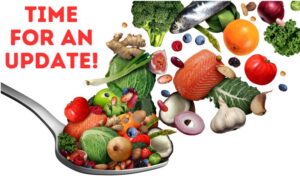
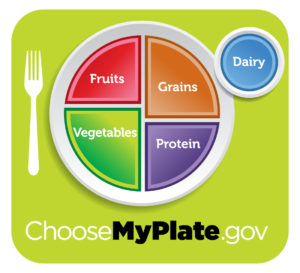
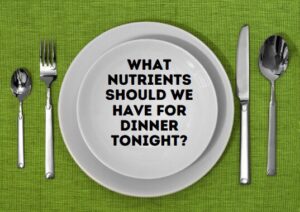
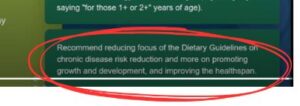
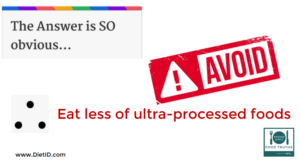

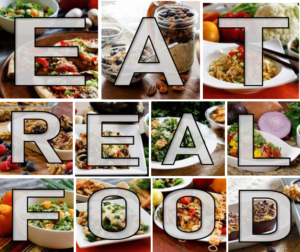
Just my honest opinion, but if anyone plans to be healthy they need to think for themselves and go as Real Food as possible and forget what the government may or may not recommend. I think with the right people, they can make a slight difference with the guidelines, but there’s a lot of money controlling these decisions. Do what it right for you and your family.
I’m totally a big fan of the “Eat Real Food” mindset. After looking at the infographic my mind is blown…I will continue to follow Krista and Zonya in my health care journey because you guys make everything simple to follow. And simple and easy to follow is the way to go.
Thank you Krista and Zonya for all you do for us.
Awe Linda! Thank YOU SO VERY MUCH! Krista and I appreciate all your support. Together, we can do this! xxoz!
I for one don’t trust the Federal U.S. Dietary Guidelines. Fortunately, there are reliable sources such as EatRealAmerica, and RDNs like Zonya Foco that speak the truth, without bias.
In just four months, with the help of Eat Real America and Zonya’s Dodging Diabetes Deliciously, I was able to reduce my A1C from 6.6 to 4.4, triglycerides from 275 to 102, and glucose from 202 to 106. These results have been truly life-changing. Best of all, without the help of prescription drugs. That’s right, just a healthy diet and exercise!
Your programs taught me the importance of being diligent in eating fruits and veggies, cutting out all added sugars, processed foods, and reducing carbs.
For the past six years, my doctor warned me at every appointment, “You’re prediabetic, your A1C is going up,” until eventually he said, “It’s Diabetes now—time for Metformin.” I refused the medication and turned to your online program instead. Four months later, I shocked my doctor with perfect glucose, A1C, cholesterol, and LDL levels.
Thank you for empowering me to take control of my health and Dodge Diabetes for good. I highly recommend Eat Real America and Dodging Diabetes Deliciously to anyone ready to make a real change!
The more I read, the more I agree with your evaluation. Thanks for educating us on this new update, I think lol.
I have recently been reading Dark Calories. Curious if you have and if you have an opinion on it. Especially about the saturated fats info.
Thanks, Carol
I am a health teacher and always questioned the old food pyramid. The guidelines are too complicated to understand and put in practice. I agree with the simplification aspect of the theme “Eat Real Food! It is simple to understand and easy to differentiate between foods close to the farm and processed food (kids can understand this concept).
I have been successful in losing weight just following this concept instead of dieting. I can truly say it has changed my life. My first Zonya class (DietFree) got me started and the Eat Real America resource has made it simple and easy. It’s my new way of life.
Eating Real Foods tastes better! Thank you!
Thanks for posting this info. It supports the Eat Real Foods program that Zonya and Krista teach!
I agree with Linda Woodruff
Thank you for sharing the Dietary Guidlines, but I have learned so much from Krista and Zonya especially the grocery store video’s you both gave shared so much good nutrition information, so I too will follow these two beautiful ladies
Thank you ladies
Sandra Trueman
So glad we signed up for your Eat Real class at our local hospital nearly FIVE YEARS ago now. That made all the difference in our health since then. You both are so knowledgeable about healthy eating and give us common sense advice. And of course, delicious recipes to help us stay motivated and on track. I hate to say it, but profit runs everything. If enough people stopped buying UPFs, the food industry would be forced to rethink what they produce and sell.
This YouTube video showed up on my feed today. The Lies That Made Food Conglomerates Rich…And is Slowly Poisoning Us: https://www.youtube.com/watch?v=vAgn5R3EUnU